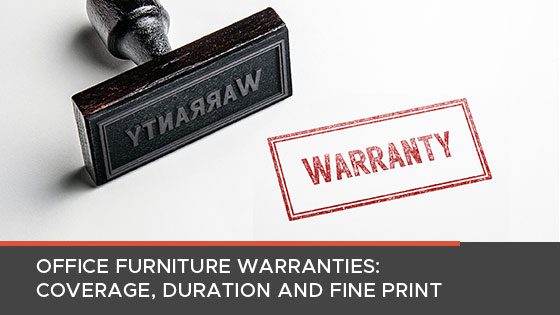Unlike electronics warranties, furniture warranties don’t necessarily cover straightforward performance issues and can be a frequent source of confusion for customers. A television either works, or it doesn’t, but if the sunlight discolours your desk does that constitute a warranty claim? What if your new task chair is uncomfortable to use, but is not visibly damaged?
To complicate matters, furniture manufacturers may also offer extended warranties at an additional charge.
All of these factors combine to make furniture warranties a complicated subject for office managers looking to equip their teams with best-in-class chairs, desks, and workstations. Some office managers merely avoid the issue and assume they’ll have to replace defective furniture out of the company budget – but that’s not always the case.
The truth is that a furniture manufacturer’s warranty can tell you a great deal about the quality of the furniture itself. Paying close attention to office furniture warranties can help you choose higher quality furniture that will last longer and provide more value than inferior options.
Types of Office Furniture Warranties and What They Cover
There are multiple kinds of warranties in the office furniture market. Office managers looking to furnish their organizations will mostly encounter three major types:
1. Full Warranty
Full warranties are rare. This is an unlimited product performance guarantee that effectively lasts forever. Anyone can send in a product with a full warranty for repair or replacement, and the manufacturer guarantees that it will perform the service, often with a “no paperwork, no questions asked” policy.
Some companies have made a name for themselves offering unlimited full warranties for their product. Unfortunately, none of them make office furniture. For the most part, this is a promise made by luxury furniture designers who create one-of-a-kind pieces.
2. Limited Warranty
These are warranties subject to manufacturer-determined limits. The most common form of restriction is on the duration of the warranty – for example, a “ten-year limited warranty.” But manufacturers can also set other limits to their warranties.
For instance, printer manufacturers may limit their warranties to a certain number of pages printed or one year of operation, whichever is less. For office furniture, it is unusual for manufacturers to establish performance limits for warranties, but it does happen. One example is weight limits for desks and load-bearing furniture.
3. Express Warranty
An express warranty is any performance guarantee made by a company about its products. This includes advertising messaging, promotional messaging, and even promises made by salespeople – if they write it down.
If an office furniture salesperson promises that a desk can withstand up to 150 pounds of dead weight and you convince that person to write that statement down on the company invoice, you have an express warranty on desk performance.
In that case, you can claim that desk warranty if a 140-pound person sits on the desk and causes it to collapse. For this reason, furniture providers are generally cautious not to make express warranties about their products.
Common Furniture Warranty Coverage Issues
A single manufacturer may issue different types of warranties for different products it sells. As a result, you may buy many kinds of furniture from a single provider only to find that the manufacturer’s desk warranty and the task chair warranty are entirely different from one another.
While almost every manufacturer guarantees that the furniture its customers receive will be free of blemishes and imperfections, details can change beyond this. If you are purchasing upholstered furniture, you should seek a warranty that the stitching is clean and consistent.
Since furniture manufacturers are often unwilling to cover performance issues, you should be wary about any warranty-related language salespeople use during their pitch. If a salesperson refuses to copy down an express warranty in writing, it’s because the manufacturer has expressly forbidden them from doing so.
There is a good reason for this. Unlike vehicle warranties, furniture warranties require shipping and logistics. It is unlikely you will receive a “loaner” desk while your broken desk is being assessed or repaired by the manufacturer, which means you could end up missing furniture for weeks or even months.
What About Extended Warranties?
Many furniture providers offer extended office furniture warranties at extra cost to customers. Office managers looking for additional security in their purchases should be wary about these promises.
Consider whether shipping and logistics are included in making an extended warranty claim. Ask whether the extended warranty covers performance-related issues. Be aware of the fact that some companies will even try to sell extended warranties covering express warranty terms they already include.
A reputable furniture provider will always offer a comprehensive warranty at no extra cost. Additionally, its salespeople will patiently explain the terms and conditions of the warranty without relying on confusing language. As a general rule: the better the warranty is, the better the furniture must be.
Have more questions about buying office furniture? You’re in luck! Our Office Furniture Buyer’s Guide answers all the questions we are most frequently asked by customers!
Cory Porteous
Marketing Manager
Office Interiors




